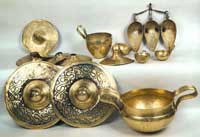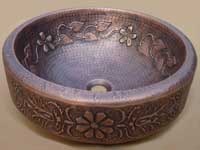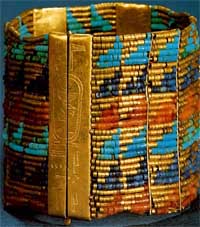


Development of chemistry, as knowledge about the transformation of some substances into others, began with the early development of fire. About 10 thousand years BC people were already familiar with the fire and searched for ways of its application. At the same time the greatest interest was caused a metal. Metal was the material, at that time it hes an incomparable strength. Metal found in a free state, and due to fire it easy to handled, already 7000 years ago people learned to make it for various objects everyday in life.
The first known metal is considered gold. It was first metal found by people in the free state and learned to make of it. With gold was a silver and copper. These metals are easily handled and relatively easy to melt. Silver and gold (even at present) in nature can be in the fused state. To separate these metals are quite complexity. Therefore, in ancient times the alloy of silver and gold was considered as simple metal (as each of them now).
Development of chemistry gave rise to the development of metallurgy and expressed at the time the production of metal, its processing and getting of individual items. The most significant development of the metallurgical craft got when people learn to get a copper from the mined ore.
In history of chemistry available phases of chemistry, which are period of development of one or other metal.
The next step development of chemistry is the development of bronze, which was included in history of chemistry as Bronze age.
Bronze age
The first getting and using of bronze occurred about 4000 BC. Bronze - is alloy, what require specific knowledge from artisans working with it metal. Such knowledge in that period had the ancient states: Egypt and Greece. The wide using of bronze articles received by the Phoenicians. A peaceful people had greater knowledge. They are widely use bronze, producing a variety of military items, primarily for sale.
The next stage of development of chemistry after the development of bronze has been the development of iron, therefore the following period, history of chemistry marked with iron age.
Iron age.
The beginning of the iron age, approximately 1200 BC.
At first time the iron metal has been considered precious. Compared with bronze, gold, silver and copper, the iron has a very high strength. It was difficult to get and to produce. In the process of development of chemistry and, accordingly, metallurgy, people learned to get alloy of iron and carbon, now called steel. The production of steel has given a new step to the use of iron - the production of durable weapons.
In history of chemistry it is known that ancient state, that has a great knowledge, was Egypt. The inhabitants of Egypt were able to produce a variety of dyes, prepare soap, products of perfumery, in addition, they were able to fuse and get the glass and to prepare medicines. All this knowledge was quite effective, but had no scientific justification. Receive items or substances occurred as a result of observations and experiments without explanation. All the knowledge obtained in strict secrecy was kept and passed down by the priests, regarded as servants of God, which at that time was a Land.
In history of chemistry the ancient Greek, the state also is a significant role in the development of chemistry as a science. The Greeks learned from the Egyptians, and resulting of the development of it knowledge is chemistry. But it is also interesting that name chemistry has, after all, Egyptian origin, as the ancient Egyptians called their country Chem.
Chemistry was a part of all knowledge, which tried to explain 600 years BC. Knowledge gradually separated from religion and passed to the independent attitude of the surrounding nature. This separation of science and religion occurred with the philosophic side.
One of the first founders of this perception of the world was the famous philosopher Aristotle, assuming that all existing objects and substances can only consist of four fundamental elements are water, fire, earth and air. Each of these substances characterizes private property, so water - humidity, land - cold, warm, fire - heat, air - dry. In addition, he said that water is a liquid, air - gas, earth - solid and fire - cracked. Before Aristotle, the philosopher Democritus spoke and argued that all existing and environment matter consists of tiny indivisible particles!
In European countries the knowledge about the transformation and interaction of substances was taken by the Arabs, who were able to conquer the peoples of the East. The people of the East had knowledge of chemistry, which was transformed to the Arabic name Alchemy. Over time, knowledge became known as chemistry.
In the VII century, in a time when there was still the Arabic name Alchemy, the people who were done the science, thought that the metals are such substances, which consist of 3 main elements: salt - as a symbol of toughness and ability of solubility, sulfur - substance is able to heat and burn at high temperatures and mercury - substance that is capable of evaporation and glitter. It was assumed that, for example, gold was a precious metal, too, has the same elements, and therefore it is can be got from any metal! It was assumed that getting gold from any other metal due to the action of the philosopher's stone, which had unsuccessfully tried to find the alchemists. In addition, it was believed that if you drink an elixir made from this stone, you will gain eternal youth!
No philosopher's stone or gold from other metals in the history of chemistry alchemists live in the middle ages to find and could not do that. But we got a lot of experience with many substances, more open elements and their properties.
XV century - the period in history of chemistry is marked with the use of alchemy for making various medicines. Due to the development of chemistry and exact Sciences, chemistryit has increasingly acquired a scientific character. Chemistry was gradually separated from philosophy and, as the science is built on generalizations and analysis of certain observed events.
Gradually, the level development of chemistry allowed to create companies that took a scientific approach to chemistry, could transfer and continue to accumulate knowledge. These places were the first Academy. So in 1560, this Academy was formed in Naples. 100 years later a similar Academy was founded in London.
In the second half of the seventeenth century Irish scientist Robert Boyle attempts to explain some chemical transformations on the basis of the use of atomic structure (on the theory of Democritus).
The first step in development of chemistry, where chemistry has existed as a science can be considered since the open of "law of conservation of mass". This law was first formulated by Lavoisier, who in the process of their scientific activities laid the foundations of the study of material with scientific point!